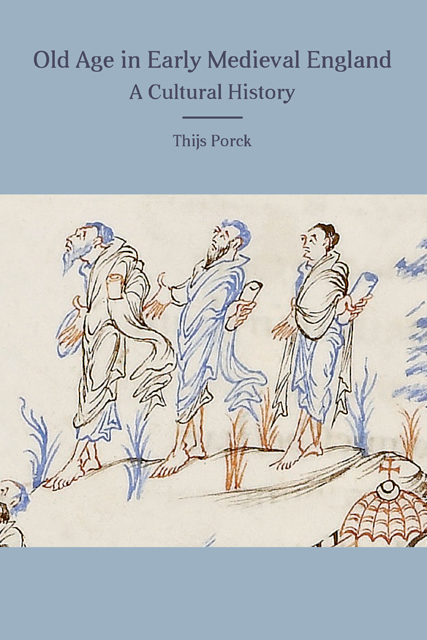Book contents
- Frontmatter
- Contents
- Illustrations
- Acknowledgements
- Abbreviations
- Introduction
- 1 Definitions of Old Age
- 2 Merits of Old Age
- 3 Drawbacks of Old Age
- 4 frode fyrnwitan: Old Saints in Anglo-Saxon Hagiography
- 5 hare hilderincas: Old Warriors in Anglo-Saxon England
- 6 ealde eðelweardas: Beowulf as a Mirror of Elderly Kings
- 7 gamole geomeowlan: Old Women in Anglo-Saxon England
- Conclusion
- Bibliography
- Index
- Anglo-Saxon Studies
2 - Merits of Old Age
Published online by Cambridge University Press: 17 January 2023
- Frontmatter
- Contents
- Illustrations
- Acknowledgements
- Abbreviations
- Introduction
- 1 Definitions of Old Age
- 2 Merits of Old Age
- 3 Drawbacks of Old Age
- 4 frode fyrnwitan: Old Saints in Anglo-Saxon Hagiography
- 5 hare hilderincas: Old Warriors in Anglo-Saxon England
- 6 ealde eðelweardas: Beowulf as a Mirror of Elderly Kings
- 7 gamole geomeowlan: Old Women in Anglo-Saxon England
- Conclusion
- Bibliography
- Index
- Anglo-Saxon Studies
Summary
“Nothing fluctuates more than the contours of old age, that physiological, psychological and social complex”, the historian George Minois wrote in his pioneering work Histoire de la vieillesse: De l’Antiquité à la Renaissance. Studying the representation of old age across time, Minois posited a dominant image of senescence for each time period and noted that there was a consistent switching back and forth between respect for and ridicule of the elderly. More recent historical approaches have rejected this idea of a periodic pendulum shift between admiration and abhorrence. Instead, they have highlighted the persistence, continuity and durability of a dual image of old age: despised for its loss of physical prowess, but revered for its wisdom and experience. This chapter, on the merits of age, and the next, on its drawbacks, review how various Anglo-Saxon poets and homilists dealt with these two opposing sides to old age.
The representation of old age is culturally defined; in gerontocratic communities, for instance, the elderly will usually be portrayed in a positive light, whereas societies that prefer the qualities of youth over age will generally devalue old age in their literature. Literary texts have long since been studied as vehicles for the cultural construction of old age. Thus, scholars of Modern English literature, such as Richard C. Fallis and Richard Freedman, have noted that old age is rarely depicted as something desirable, reflecting an overarching attitude of ‘gerontophobia’: the fear of old age. These modern sentiments appear in stark contrast to what Burrow and Crawford proposed with respect to the literary evidence of Anglo-Saxon attitudes towards senectitude. The former argued that the emphasis on the moral and spiritual superiority of the elderly was such that the Anglo-Saxons preferred old age above all other age categories. Burrow related this Anglo-Saxon predilection for agedness to the idea that “in a traditional society such as that of Anglo-Saxon England … men must have relied more than they do today upon the wisdom of experience”. Crawford followed Burrow’s lead and also linked the apparent appreciation of the elderly in texts to their position in society:
According to the majority of the Old English literary evidence, old people were idealised and venerated in Anglo-Saxon society.
- Type
- Chapter
- Information
- Old Age in Early Medieval EnglandA Cultural History, pp. 52 - 75Publisher: Boydell & BrewerPrint publication year: 2019



